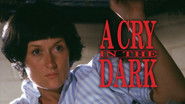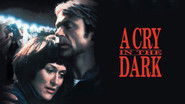James Hitchcock
In August 1980 a nine-week-old baby girl named Azaria Chamberlain disappeared from a camp-site near Ayers Rock, Australia. The baby's mother Alice (generally known as Lindy) stated that her daughter had been taken by a wild dingo, and a subsequent inquest ruled that her account of events was true. That, however, was not the end of the matter. The police continued to investigate the disappearance, and eventually Lindy was charged with Azaria's murder; her husband Michael was charged with helping her dispose of the body. In October 1982 both were convicted and Lindy was sentenced to life imprisonment. (Michael was only given a suspended sentence). Several years later fresh evidence came to light which led to Lindy's release from prison; in 1988, shortly before this film was released, both the Chamberlains were acquitted by the Northern Territory Court of Appeals of all the charges against them.The "dingo baby case", as it became known, was one of the most controversial cases in Australian legal history. I remember an Australian friend coming to visit me in the early nineties, several years after Lindy and Michael Chamberlain had been exonerated, and as like me he was a keen film enthusiast I suggested that we should watch "Out of Africa" which was on television that evening. He refused point blank, stating that ever since the release of "A Cry in the Dark" he had made it a principle not to watch any film starring Meryl Streep because of what he described as her part in the "whitewashing of a notorious child-killer". My friend's attitude was by no means unusual in Australia. The case divided public opinion sharply in that country, with the majority probably believing that the Chamberlains were guilty. Gossip about them was widely repeated and quickly accepted as the truth. One thing that even the prosecution was unable to come up with was a plausible motive for the alleged crime. Those, however, who wanted to see the Chamberlains prosecuted in the court of public opinion were not so reticent. The couple were members of the Seventh-day Adventist Church- indeed, Michael was a pastor in that church- and rumour soon had it that Adventist religious doctrine demands the human sacrifice of young children in order to atone for the sins of the community. It was also widely, and incorrectly, reported in the media that the name Azaria means "sacrifice in the wilderness". Few of those who passed on these rumours had any real interest in Adventism, or how the doctrines of that church differ from those of mainstream Christianity; they merely saw the church as a bizarre and fanatical cult. This was the second film directed by Fred Schepisi in his native Australia. His first film, "The Chant of Jimmie Blacksmith", also based on a real-life murder case, was part of the Australian "new wave" of the Seventies, but soon after making it Schepisi left for Hollywood. It is a dry, factual look at the facts of the case in the manner of a television docudrama; there is little to distinguish it from a "based-on-a-true-story" TV movie except for the presence of a major international star in the shape of Meryl Streep. (That and the fact that it is more factually accurate than most TV movies). Streep gets a chance to add another to her collection of accents, having earlier in the decade bagged British ("The French Lieutenant's Woman", "Plenty"), Polish ("Sophie's Choice") and Danish ("Out of Africa"). (Some people still think of her as an actress whose main skill is the ability to reproduce foreign accents, even though since the end of the eighties she has rarely played characters who are not American, her Italian-born housewife in "The Bridges of Madison County" and Margaret Thatcher in "The Iron Lady" being the main exceptions). Here she gives an excellent performance as Lindy Chamberlain. What is so remarkable is that she is able to convey not only her Lindy's strength of personality and belief in her own innocence but also the character traits which persuaded many people that Lindy was in fact guilty. Meryl was nominated for a "Best Actress" Oscar but lost out to Jodie Foster in "The Accused". What alienated so many members of the public was Lindy's refusal to make a show of her grief and her calm demeanour and stoical acceptance of her daughter's death. This attitude was probably based on Lindy's firm religious beliefs, her conviction that Azaria's death was the will of God and that her daughter had gone to a better life in Heaven, but many people took it as cold-heartedness, even as proof of her guilt. Sam Neill is also good as Michael, a weaker character than his wife, who confronted with disaster loses faith both in God and in Lindy's innocence. "A Cry in the Dark" has many similarities to a number of British films from around this period dramatising real-life miscarriages of justice, such as "Dance with a Stranger" and "Let Him Have It". Films of this nature, quite apart from their entertainment value, also have a useful social function in that they remind us of how easily such miscarriages can occur. In Lindy Chamberlain's case the main factors appear to have been public hysteria, prejudice against a minority religion, the irresponsibility of parts of the media and flawed "expert" evidence. (Azaria's clothing was examined by a British forensic scientist with no knowledge of dingoes; a chemical sprayed on the Chamberlains' car as a sound deadener was mistaken for blood). That the Chamberlains were eventually exonerated was largely due to the chance discovery of new evidence; one wonders how many innocent people are still in jail waiting for such evidence to turn up. 7/10
Michael Neumann
The facts in the case of an Australian couple persecuted by a headline-hungry press should be familiar to viewers of the CBS news show 60 Minutes, which aired the story (not coincidentally) just before this film was released. Both versions recount the disappearance during a weekend camping trip of Lindy and Michael Chamberlain's infant daughter, and the subsequent three-ring media circus which led to wild (and totally fabricated) accusations of cult fanaticism and ritual sacrifices, and eventually to a murder conviction for the bereaved mother. But the big screen dramatization has more in mind than just a strong reprimand for misguided journalism ethics. The reporters covering the case are shown to be more ferocious than the wild dingo dog claimed by the Chamberlain's to have killed their child, but the screenplay wisely implicates public opinion as well, which condemned Lindy Chamberlain to prison for not having a telegenic personality (the same trait might also lose her sympathy with moviegoers, despite another challenging performance by Meryl Streep). Director Fred Schepisi presents the story as a straightforward, undemonstrative docudrama, letting the cold-blooded courtroom drama speak for itself, with a pair of excellent actors (Streep and Sam Neill) taking up the slack.
RyanCShowers
A Cry in the Dark is an alright film with Meryl Streep's better than average performance. Streep has never seized to amaze me. She can play any role, in any dialect. She delivers a fine performance here. I don't think it's near her work in Sophie's Choice or Silkwood, but she still gives it her all. Other than Streep, it's not bad, but certainly not great. It lacks something that made Sophie's Choice and Kramer vs. Kramer had, Streep's other films. The neat thing about the story is that you see the other side of when people get accused of things. You see both sides of it. But, at that it repeats itself a lot. We see the same event over and over again. Overall, just an okay film with a typical great performance from Streep; 6
tieman64
Azaria Chamberlain, a nine week old Australian baby, disappears whilst on a camping trip with her family. Her parents report that the child was taken from her tent by a wild dingo. No body is found. The parents are arrested, suspected of murder.A highly publicised court-case follows. Azaria's mother, Lindy Chamberlain, is tried for murder. The media and public, finding the woman surprisingly cold, somehow get it into their collective heads that the parents are guilty because of this. As the media's focus on the trial is highly sensational, what follow is a public lynching of sorts, Lindy convicted of murder and sentenced to life imprisonment. Azaria's father, Michael Chamberlain, is then convicted as an accessory and given a suspended sentence.I will not spoil the film's conclusion, suffice to say that actress Meryl Streep, who plays Lindy Chamberlain, lends the film surprising power. Streep plays a very cold character, deliberately off putting. We're thus suckered, like the public, into believing we too can successfully "spot a liar".7.9/10 – Gentle direction, nice music and an impressive performance by Meryl Streep and Sam Neill as the film's central couple, make this an effective docudrama. The film's themes - "one woman against the world", "steadfast faith", "religious trials", "the importance of innocence" and "the danger of rash judgements" – are standard "movie of the week" stuff, far less interesting than Streep's performance. Worth one viewing.





